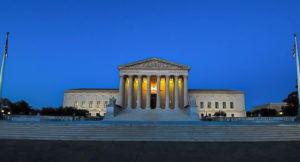 In a monumental Supreme Court decision regarding a North Carolina case, the majority of justices just issued a ruling that could reshape state election laws across the country. The ruling pertained to who has the authority to determine the specifics of how, when, and where Americans can vote and whether state courts can regulate the process.
In a monumental Supreme Court decision regarding a North Carolina case, the majority of justices just issued a ruling that could reshape state election laws across the country. The ruling pertained to who has the authority to determine the specifics of how, when, and where Americans can vote and whether state courts can regulate the process.
The court, led by Chief Justice John Roberts, in a 6-3 decision, dismissed an expansive interpretation of the theory known as “independent state legislature”. The theory proposes that the Elections Clause of the U.S. Constitution gives state legislatures exclusive control over federal elections, free from the usual oversight of state constitutions, courts, and governors.
Moore v. Harper (2023) pic.twitter.com/W1tc7HC6gW
— Simplified SCOTUS (@SimpleSCOTUS) June 27, 2023
The case in question, Moore v. Harper, revolved around a gerrymandered voting map implemented by the North Carolina state legislature. The state’s Supreme Court had invalidated the map for being inconsistent with the state’s constitution, and the U.S. Supreme Court was asked to reinstate it.
Chief Justice Roberts, along with Justices Sonia Sotomayor, Elena Kagan, Ketanji Brown Jackson, Brett Kavanaugh, and Amy Coney Barrett ruled against the Republican lawmakers involved in the dispute over the North Carolina congressional map.
In his written opinion, Roberts stated that the Elections Clause “does not insulate state legislatures from the ordinary exercise of state judicial review.” This ruling effectively dispels the theory that state legislatures can conduct federal elections without the usual checks and balances.
Experts in election and democratic processes had cautioned that a full adoption of the “independent state legislature” theory could significantly influence the operation of elections and the drafting of voting regulations in the U.S.
The dissenting justices on the bench were Clarence Thomas, Neil Gorsuch, and Samuel Alito.
What do you think about the decision?


